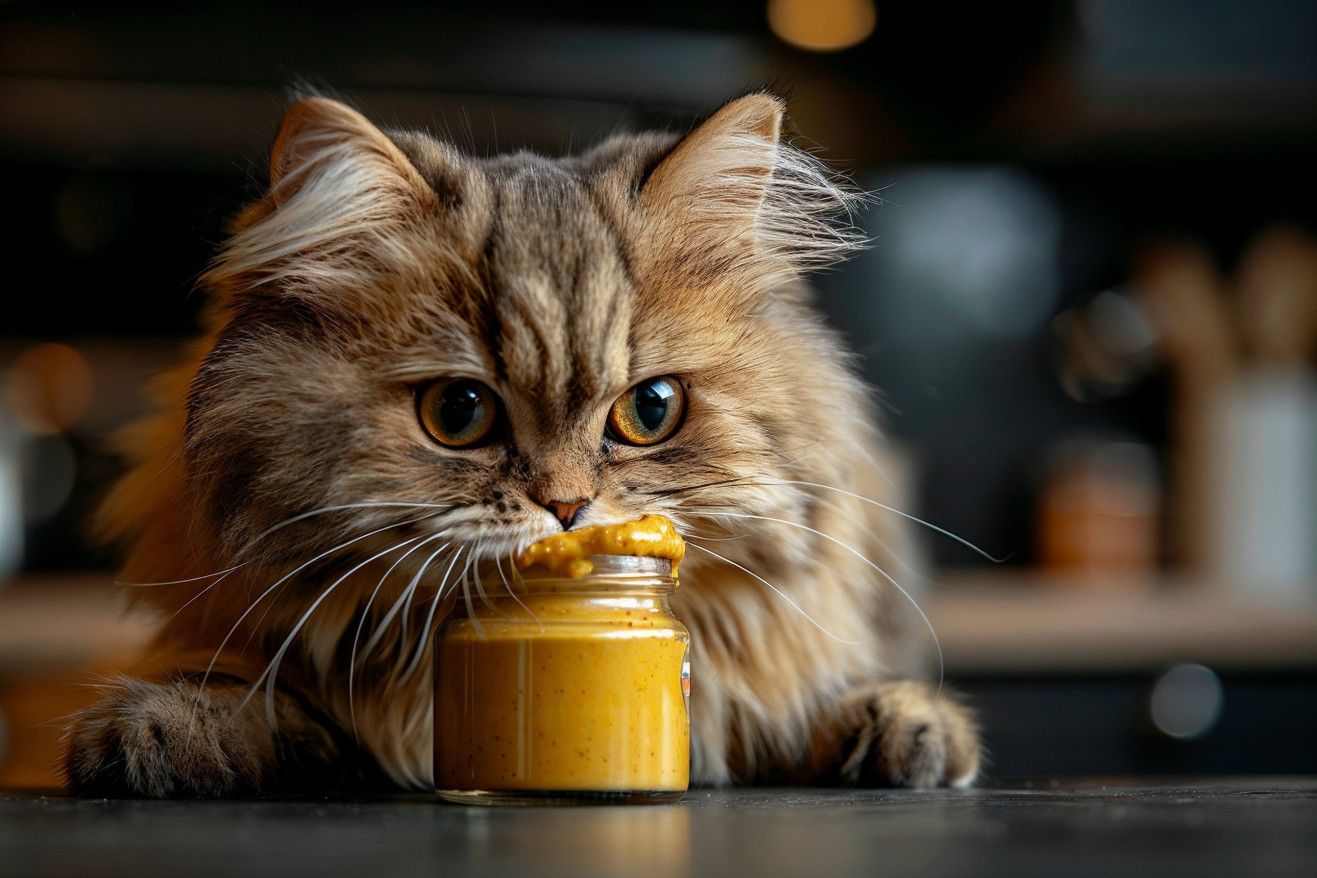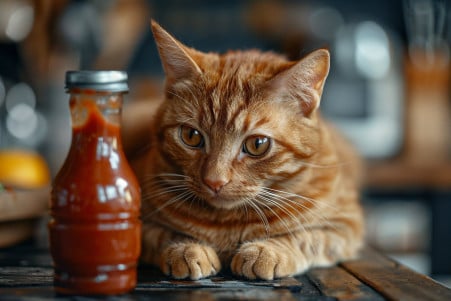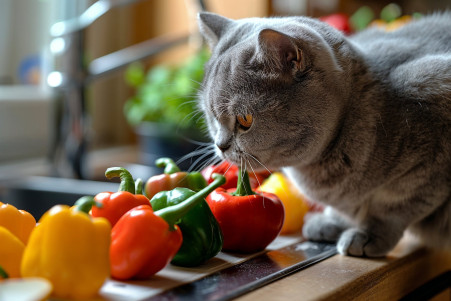Can Cats Have Mustard? Potential Dangers
6 May 2024 • Updated 6 May 2024

If you’re a fan of mustard, you may be tempted to share this zesty condiment with your cat. However, cats cannot have mustard because it contains compounds such as mustard oil and sulfur that can lead to gastrointestinal upset, and it may also include spices and other ingredients that are toxic to cats.
While it’s natural to wonder about the safety of different human foods for your cat, this article will review the latest veterinary science and expert opinions to help you better understand whether cats can have mustard. By examining research on feline nutrition, food toxicity, and gastrointestinal issues in cats, we’ll cover the potential dangers and explain why you should avoid giving your cat this common table condiment.
Can cats eat mustard?
Hazards and Side Effects of Cats Eating Mustard
In cats, mustard can lead to gastrointestinal upset, which can include vomiting, diarrhea, and abdominal pain. In addition, Pet Care Studio notes that cats can experience respiratory distress, lethargy, swollen face, hives, and pale gums. The severity of these symptoms will depend on the amount of mustard that the cat has ingested, but even small amounts can be toxic.
Since cats are obligate carnivores, mustard doesn't offer them much nutrition, so there's no reason to take the risk of giving them this human food. If a cat does eat mustard, it's important to get them to a vet right away because vomiting may not be the best course of action. The isothiocyanates and glucosinolates in mustard can cause a lot of irritation in a cat's digestive system, which can lead to serious issues if it's not treated. While it's understandable that cats are curious about the foods their human family members eat, the risks of letting them eat mustard are not worth any potential rewards.
More Toxic Foods for Cats
Besides mustard, there are many other human foods that cats should stay away from due to their toxicity or other harmful effects. According to the ASPCA, other foods that can be dangerous for cats include grapes, raisins, onions, garlic, raw meat/fish, dairy, chocolate, and xylitol.
While some fruits, vegetables, and cooked meats can be safe in small amounts, it's always best to check with a vet first, as Pawlicy Advisor notes. Cats can also be kept safe from eating these foods by introducing new foods slowly and keeping human food in a safe place. If a cat does eat a food that's toxic to them, it's important to get them to a vet right away, as PetMD explains.
Mustard Greens: A Safer Alternative?
In contrast to yellow mustard, mustard greens are considered safe for cats to eat in small amounts, says Pet Care Advisors. Mustard greens should be cooked or ground up to reduce the oxalic acid that they contain before being given to cats. Although they don't have any known health benefits, mustard greens are not poisonous to cats when ingested in small quantities.
That said, if a cat eats a lot of mustard greens, it can still lead to digestive upset. If a cat eats a large amount of mustard greens or yellow mustard, it's important to contact a vet.
Concentrated Mustard Products and Treatment
Concentrated forms of mustard, such as mustard powder and mustard oil, are even more dangerous for cats. According to PureForm, eating large amounts of these products can cause severe gastroenteritis. Signs of mustard poisoning in cats include gastrointestinal upset, such as vomiting and diarrhea.
If a cat has eaten a large amount of concentrated mustard, it is important to seek veterinary attention immediately. That said, it is not recommended to try to induce vomiting in cats, as this can lead to other issues or cause the animal distress. While a small amount of mustard may cause mild gastrointestinal upset, the concentrated forms of the condiment are much more dangerous for cats.
Mustard Seeds: A Potential Hazard
Mustard seeds, which are used to make mustard, are toxic to cats. As noted by Waldo's Friends, mustard seeds can cause severe gastrointestinal upset with symptoms like vomiting and diarrhea. In addition, the spicy taste of mustard seeds is unappealing to cats and can cause nausea and bloating.
Although the ASPCA doesn't mention the mustard plant as a cat toxin, multiple sources caution against cats eating mustard seeds. As a result, it's important to keep mustard seeds in a secure location where cats can't access them.
Conclusion: Preventing Mustard Poisoning in Cats
As Hepper explains, while mustard has health benefits for people, it should not be given to cats because the components can cause gastrointestinal problems such as vomiting and diarrhea. Mustard seed can cause gastroenteritis, and other ingredients in commercial mustard products, including salt, alcohol, flavorings, and spices, are not recommended for cats.
Cats are obligate carnivores, so they have different dietary requirements than people, and mustard does not offer much nutritional value for cats. While mustard greens are not toxic, they can cause stomach upset and are bitter, so they are not a good option for cats either. Even the mildest form of mustard, yellow mustard, can cause indigestion, diarrhea, and vomiting in cats.
BeChewy notes that mustard seeds, a key ingredient in mustard, are toxic to both dogs and cats because they can cause severe gastroenteritis. Symptoms of mustard poisoning include diarrhea, vomiting, loss of appetite, abdominal pain, respiratory distress, lethargy, swollen face, hives, and pale gums.
Meanwhile, Pet Care Studio explains that while a small amount of mustard may not cause immediate harm, the isothiocyanates and glucosinolates in mustard seeds are toxic to cats and can irritate the digestive system, leading to vomiting, diarrhea, and abdominal pain. Cats can also be allergic to mustard. Inhaling mustard powder can even irritate a cat's respiratory system.


